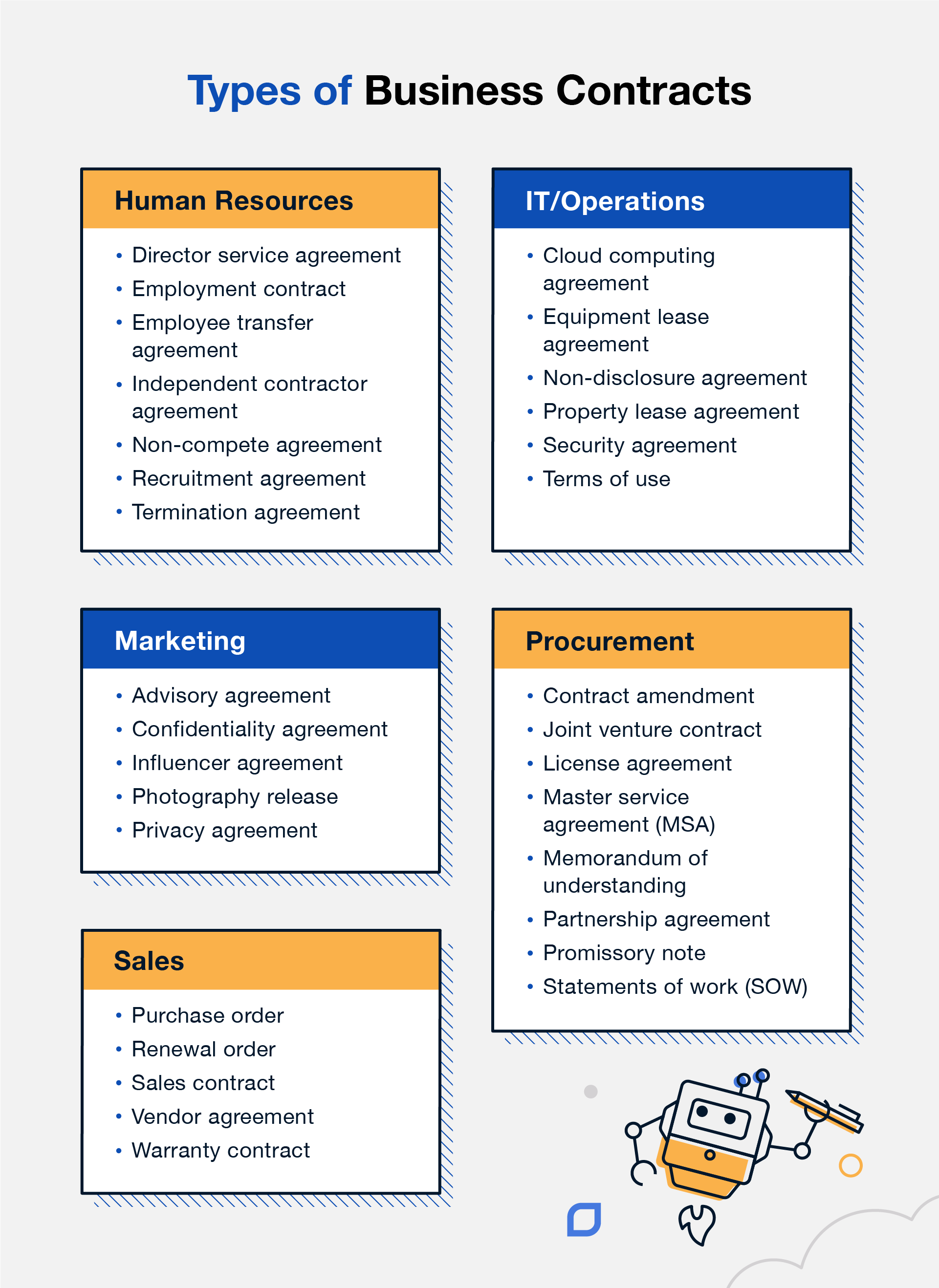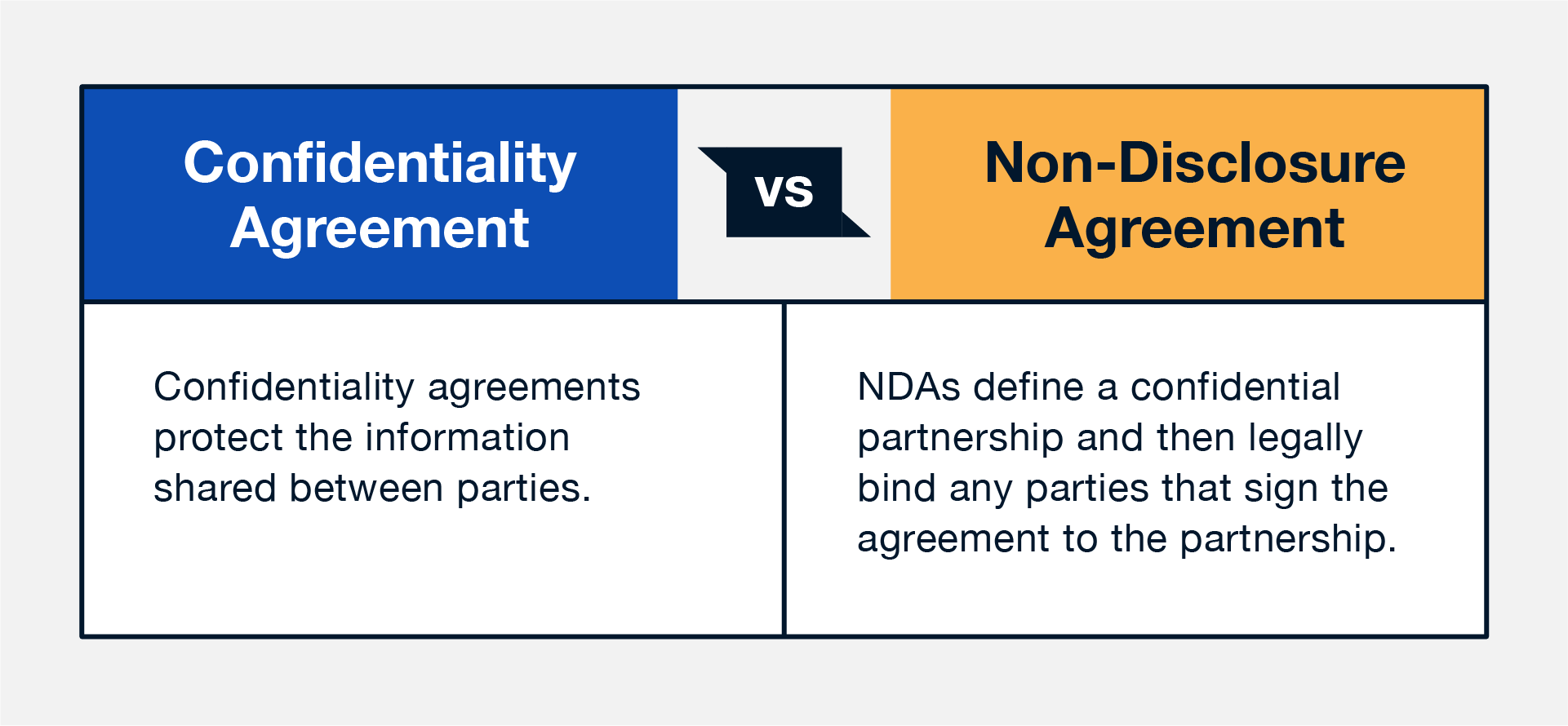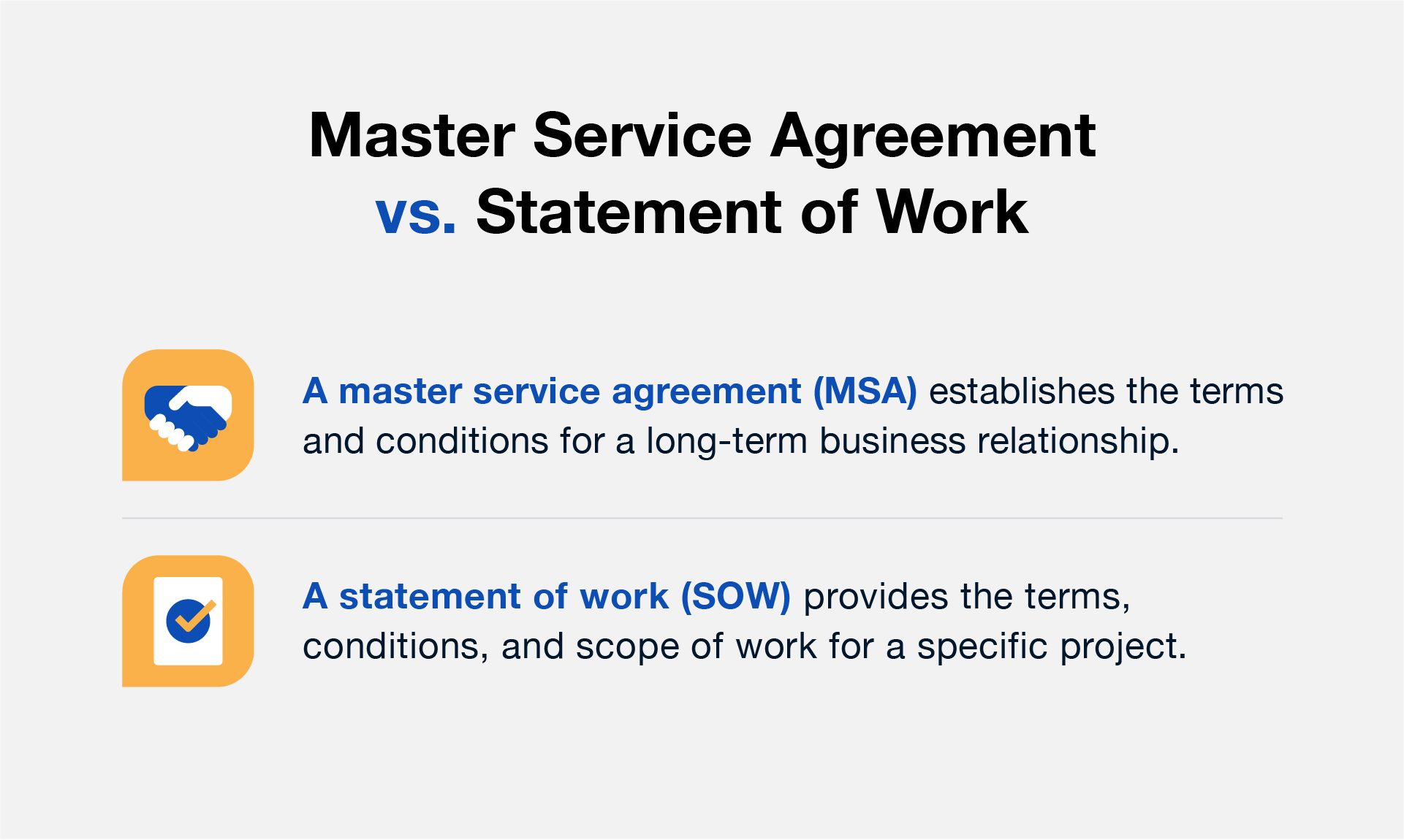If we learned anything from the Taylor Swift vs. Scooter Braun fiasco, it’s that a business contract can really make or break you.
Business contracts provide the legal framework for the exchange of goods and services between two (or more) entities, paving the way for smooth business and operations shielding you from legal loopholes.
Whether you run a mobile grooming salon or a multimillion-dollar tech corporation, every business requires effective contract management to minimize legal risk, preserve contract value, and outline the expectations of both parties.
If the phrase “let’s shake on it” makes you cringe, this article will help you discover more about the types of business contracts you’ll need to keep your business and partners in check.
TL;DR
- Business contracts are essential for your business’s success, and everything from equipment rentals to influencer marketing should be covered in a contract..
- There are dozens of types of business contracts you’ll need to protect your business’s best interests.
- CLM software like ContractSafe helps keep your contracts organized and accessible.

1. Director Service Agreement
Contract Type: Human Resources
A director contract is a legal document that outlines the duties and responsibilities of a company's board of directors. The contract also sets forth the compensation that the directors will receive for their services — essentially a contract of employment for your employers (if that makes any sense).
Director service agreements aren’t legally required, but it’s good practice to have one in place. Companies use director contracts to protect themselves from liability. The contract ensures that the board of directors understands their roles and responsibilities, which can help prevent disputes between the directors and the company.
2. Employment Contracts
Contract Type: Human Resources
Employment contracts set forth all the terms of the relationship between employer and employee, including:
- Compensation
- Employee classification
- Benefits
- Time off policy
- Employment period
- Confidentiality and privacy
- Work obligations
- Termination and severance
Follow the legal guidelines provided by the U.S. Department of Labor to make sure your employment contracts are up to par with current laws and regulations.
3. Employee Transfer Agreement
Contract Type: Human Resources
Your employees are your greatest asset, but circumstances may arise in which you may need to share the wealth. A transfer agreement contract is a document that outlines the terms and conditions of an employee transfer from one company to another while keeping the original employment relationship intact. These contracts include:
- Changes to salary or benefits
- The length of time for which the transfer will last
- Specific terms and conditions for both employers and the employee
- Employee consent to transfer
The employee must give either explicit or implicit consent in order to seal the deal, and the original employer must fulfill its obligations to the employee in order to uphold it.
4. Independent Contractor Agreement
Contract Type: Human Resources
Independent contractors, or 1099 employees, differ from full- or part-time employees because contractors are responsible for their own taxes, insurances, and other business-related expenses. They can provide valuable services and skills to a business that may not have the means for an additional full-time employee.
An independent contractor agreement outlines the scope of work, deliverables and expected end result agreed upon by both parties. These contracts often cover:
- Confidentiality clauses
- Compensation
- Payment terms
- Effective dates
- Ownership of intellectual property
- Causes for termination
- Cancellation fees
5. Non-Compete Agreements
Contract Type: Human Resources
Non-compete agreements provide that an employee who leaves the company will not compete against it within a specified geographical area for a specified period of time. Employment agreements and non-compete agreements can be entered separately, or the non-compete provision may be a clause within the employment agreement.
Given that employees move from one job to another far more frequently now than ever, non-compete clauses allow a company to protect itself from an employee taking institutional knowledge or trade secrets to a competitor, or using such knowledge to start a competing business.
6. Recruitment Contract
Contract Type: Human Resources
Good talent is hard to come by, especially in highly technical fields like engineering or UX design. Locking in a third-party recruiter with a recruitment contract can help bring the talent to you.
A recruitment contract is a legal agreement between an employer and a recruitment agency. The contract sets out the terms and conditions of the relationship between the two parties, including:
- The roles and responsibilities of each party
- The fees payable by the employer to the agency
- The length of time for which the contract will be in place
- A clause specifying that either party may terminate the contract at any time with written notice
By including all four key components in your recruitment contract, you can help ensure that both parties are protected and that their rights and obligations are clearly defined.
7. Termination Agreement
Contract Type: Human Resources
Relationships end, and if we learned anything from our last breakup it’s that it's best to keep things straightforward and civil. A termination agreement can help you avoid a messy breakup with an employee or contractor.
Termination agreements outline the specific reasons for the termination, such as breach of contract or failure to perform.
It’ll also highlight any obligations that survive the termination. This can include things like severance pay or the return of specific materials. Termination agreements make it clear that everyone involved agrees to the cancellation of the original contract and will include key details like the names of the parties involved, the effective date of the termination, and a detailed scope of severance pay.
8. Cloud Computing Agreements
Contract Type: IT/Operations
In today’s digital age, many businesses rely on the power of the cloud to store proprietor data and customer information. A cloud computing agreement is a legally binding contract between a cloud service provider and a customer that sets forth the terms and conditions under which the service provider will provide its services to the customer.
The agreement will typically include provisions regarding:
- The type of services to be provided by the service provider
- The customer's responsibilities
- The service provider's responsibilities
- Service levels and availability
- Intellectual property rights
- Data security
- Confidentiality
- Limitations of liability
- Payment terms
9. Equipment Lease Agreement
Contract Type: IT/Operations
Equipment refers to anything your business needs to operate, ranging from huge pieces of machinery to that absolutely necessary deluxe cappuccino maker. Equipment can cost hundreds of thousands of dollars to own, so many companies choose to lease theirs under an equipment lease agreement.
This type of contract gives the lessee the right to store and use (but not own) the lessor’s equipment for a certain period of time in exchange for compensation. The lessee will also be responsible for maintaining and paying taxes on the equipment during this period.
10. Non-Disclosure Agreement (NDA)
Contract Type: IT/Operations
An NDA differs from a confidentiality agreement because it defines a confidential partnership and then legally binds any parties who sign the NDA to that partnership.
These types of agreements are often used in business transactions or third-party relationships to prevent wrongful or unauthorized use or disclosure of proprietary information.
With this type of business contract, the party releasing sensitive information agrees not to disclose it without the permission of the receiving party, who also agrees not to use it for any other purpose than what’s specified in the NDA.
NDAs can protect any type of sensitive information, including:
- Trade secrets
- Business plans
- Financial information
- Proprietary information
11. Property Lease Agreement
Contract Type: IT/Operations
In the business world, lease agreements are especially common for commercial real estate. These contracts include a lease term, the amount of rent, and other details of the rental.
Notably, lease agreements sometimes include auto-renewal provisions. Many companies have been known to lose track of relevant auto-renewal dates, thereby inadvertently renewing a lease automatically (or missing an opportunity to renew at a lower price).
12.Security Agreement
Contract Type: IT/Operations
Have you ever had to fork up a security deposit for a rental? No, your landlord wasn’t conning you into covering the down payment for their new car. Your security deposit was a form of collateral you provided as part of your security agreement.
A security agreement is a legal contract that provides a lender some form of collateral in case of a default or breach of contract by the borrower. This collateral is used as assurance that the borrower will fulfill their responsibilities covered in the loan.
13. Terms of Use
Contract Type: IT/Operations
Even if only a few users actually read them, if you operate a website you’re going to need to include a terms of use agreement. A terms of use agreement between two parties — in most cases, a website owner and a user. By agreeing to the terms of use, the user is legally bound to abide by the rules set forth in the agreement contract. Similarly, the website owner is legally bound to uphold their end of the bargain.
Terms of use agreements typically cover:
- Limitation of liability
- Website or product use guidelines
- Abuse and termination clause
- Privacy policy
- Intellectual property clause
- Cookie use
- Disclaimer that terms are subject to claim
The terms of use contract protects both parties involved. A few ways you’ll benefit legally from this type of contract include:
- Limited liability from errors
- Limited liability from user content
- Content protection
- Abuse prevention
14. Advisory Agreement
Contract Type: Marketing
Many businesses seek outside counsel when first starting up or adapting to a monumental change — like the shift to remote work we saw in 2020. An advisory agreement is a contract between a company and an individual who provides advice and consultation to the company.
The terms of an advisory agreement can vary depending on the needs of the company and the expertise of the individual, but there are some common elements that are usually included, such as:
- Compensation
- Scope of work
- Confidentiality
- Term/renewal clause
15. Confidentiality Agreement
Contract Type: Marketing
In these contracts, one or more parties agree not to disclose specific information to third parties. Such contracts are especially useful for companies that rely on proprietary technology or processes, or need to protect other secret information. Confidentiality agreements can be standalone contracts or used as a provision with a larger agreement. It can also be used to protect private information, such as terms of a legal settlement.
Other situations where a confidentiality agreement might come into play include:
- Mergers and acquisitions, when sensitive financial and operational information must be shared between parties
- Negotiations between partners or investors
- Military agreements
- Vendor contracts

16. Influencer Agreement
Contract Type: Marketing
If you’ve happened to scroll through any social media platform within the last 10 years, you’ve likely come across an influencer hawking hair growth gummies or detox teas.
Influencer marketing relies on social media users who have built a reputation — and a substantial following — for their expertise on a specific topic. Brands create agreements with these influencers to promote their products on their platforms.
An influencer contract solidifies the relationship between a brand and an influencer by laying out the terms of the agreement. To ensure your marketing investment is protected, make sure your contract includes:
- Work description and expected deliverables
- Post frequency and timing
- Content type
- Content ownership and usage rights
- Compensation
- Brand exclusivity
- Non-disclosure agreements
It’s important to note that influencers are creatives, and a rigid contract that limits their creative freedom may keep them from signing. Don’t make the agreement too restrictive — you want the influencer to be able to produce quality content that is true to their voice.
17. Photography Release
Contract Type: Marketing
If you use photos for your marketing campaigns or social media platforms, you better be using photo release consent forms. These forms provide written permission from the owner of your subject (or the subject themselves) to share photographs of their person or property.
Photography releases are necessary for scheduled photoshoots — they’ll provide the guidelines for:
- What sort of photos will be taken
- How long the shoot will last
- Where the shoot will take place
- Publishing methods
- How much the client will pay for the shoot
You’ll need to have both parties sign a photo release form any time you plan on using an image for commercial purposes. Even impromptu photos taken in public spaces can land you in hot water without proper consent.
18. Privacy Agreement
Contract Type: Marketing
Privacy agreements aren’t just nice to have — they’re required by law to protect customer data. These agreements are designed to protect the privacy of individuals or businesses involved in a transaction, even if that transaction is as insignificant as buying your daily blueberry bagel.
Privacy policies — also referred to as data-sharing agreements — outline how each party agrees to handle sensitive data, such as personal information or financial records. The contract will also include clauses outlining what should happen if this data is lost, stolen, or misused.
These Privacy policies must adhere to local laws and regulations regarding data protection.
19. Purchase Order
Contract Type: Sales
On the flip side of a sales contract, we have purchase orders. Purchase orders are provided by the buyer, acknowledging the delivery of goods or services provided all agreements are met. If you’ve ever provided your name, address, and preferred delivery method when ordering an item online, congrats — you’ve completed a purchase order.
Purchase order contracts spell out the terms of the sale, including:
- Price
- Quantity
- Quality
- Delivery date
20. Renewal Order
Contract Type: Sales
The renewal order form contract is a document used to extend the terms of an existing contract. This typically happens when both parties want to continue working together but are still deciding whether to commit to a long-term agreement.
Renewal order forms are an effective way to encourage loyalty and provide a streamlined customer experience — instead of having to fill out a completely new order form, these simple agreements typically take minutes to complete.
The contract should include the names and contact information for both parties, as well as the date that the contract will expire. If there are any changes to the terms of the contract, such as an increase in salary or a change in job duties, these should be listed in the renewal order form contract.
21. Sales Contracts
Contract Type: Sales
Sales contracts, also known as bills of sale or purchase agreements, memorialize the terms of a sale — you likely receive a bill of sale every day in the form of receipts. Although this type of contract is most common in transactions that involve sales to consumers, nearly every company in the world uses sales contracts when working with clients or partners. These contracts record the details of the purchase, such as:
- Price
- Time of payment
- Refund policy
- Financing arrangements
Companies that utilize sales contracts and vendor agreements often must manage large numbers of documents, but storing paper contracts in file folders and searching for them when they’re needed isn’t the most efficient method.
22. Vendor Agreements
Contract Type: Sales
A vendor agreement is a contract between a business and a supplier of goods or services in exchange for compensation. These contracts can be relatively simple or extremely detailed, depending on the needs of the parties. With supply chains now spanning the world, the importance of well-crafted vendor agreements is more important than ever.
Whether you’re planning a one-time transaction or an on-going relationship with a vendor, you can use vendor agreements to benefit both you and the vendor by setting clear expectations and establishing consequences if those expectations aren’t meant. At minimum, a vendor agreement should include:
- The names of the parties involved
- A description of the goods or services that will be provided
- The price to be exchanged for said goods or services
- The deliverables and duration of the business relationship
23. Warranty Contract
Contract Type: Sales
A warranty contract is an agreement between two parties that sets forth the terms and conditions of a product warranty. The contract spells out what is covered by the warranty and what is not. It also sets forth the procedures for filing a claim and how disputes will be resolved.
Warranty contracts are typically used for products that are expensive or have a high risk of failure. Most car manufacturers offer extended warranties on new vehicles, and many home appliances come with a limited warranty from the manufacturer.
Warranty contracts are also commonly used in business-to-business transactions, like when companies that sell software offer their customers a warranty that the software will meet certain specifications.
24. Contract Amendment
Contract Type: Procurement
We can’t all get it right the first time, so contract amendments are a necessary part of doing business. Amendments can be used to modify the terms of the contract, the parties involved, or the duration of the contract.
New clauses can be added or existing clauses deleted from the contract with an amendment. To amend a contract, identify the clause that needs to be changed and draft an amendment that specifically states the change. Once an amendment has been signed by both parties, it becomes legally binding and cannot be modified without both parties' consent.
25. Joint Venture (JV) Contract
Contract Type: Procurement
A joint venture contract is an agreement between two or more parties who agree to work together on a specific project or enterprise. The contract establishes the terms of the relationship, including each party's roles and responsibilities, and sets forth the terms under which the parties will share any profits or losses.
Unlike partnership agreements, joint venture contracts are typically used when two businesses want to collaborate on a project but don't want to enter into a formal partnership. For example, a joint venture contract might be used if two companies want to collaborate on developing a new product. The contract would spell out each company's roles and responsibilities in developing the product, as well as how the profits (or losses) from sales of the product will be shared.
26. License Agreement
Contract Type: Procurement
If you’re a solo entrepreneur with a great idea but no resources to bring it to scale, you may want to dust off your pitch deck and seek a license agreement with investors.
A license agreement is a legally-binding contract between two parties that grants one party the right to bring your product to market. The terms of a license agreement must be agreed upon by both parties, and typically involve the payment of royalties or a lump sum by the licensee to the licensor.
It’s important to keep license agreements simple and clear, and to include all relevant parties in order to avoid confusion down the road. A thorough agreement covers:
- Performance expectations that the licensee must meet, such as sales goals
- The scope of the license
- Approval of outside distributors
- Liability in the event of product failures, recalls, or other issues
- Option for renewal
- Conditions for termination
27. Master Service Agreement
Contract Type: Procurement
A master service agreement is a type of contract between two companies that establishes the terms and conditions under which they will do business together long term. MSAs can save time and energy by having all terms and conditions laid out upfront, and can help business relationships grow and evolve over time.
With an MSA, you won’t need to spend time renegotiating additional contracts between ongoing partnerships like client/vendor agreements or government contracts. An MSA typically governs multiple types of agreements, including:
- Confidentiality
- Dispute resolutions
- Intellectual property rights
- Payment terms
- Venue of law
- Warranties
- Work standards
This streamlined approach allows both parties to prepare for the future and adapt to shifting business landscapes — highlighting potential areas of disagreement or concern.

28. Memorandum of Understanding (MOU)
Contract Type: Procurement
An MOU is an informal document that outlines an agreement between two parties to move forward with a contract — sort of like a partnership promise ring. It's not as legally binding as a contract, but it's more formal than a gentlemen's agreement.
MOUs are often used when two parties are exploring a potential business relationship and want to outline the terms of their agreement before moving forward. For example, if two companies are considering entering into a joint venture, they may sign an MOU to outline the parameters of their relationship.
Memorandums of understanding are also common between businesses and individuals. For instance, if you're hired by a company to consult on a project, you may sign an MOU that outlines the scope of your work and compensation.
29. Partnership Agreements
Contract Type: Procurement
A partnership can be as simple as two people forming a business and sharing management, profits, and costs equally. Partnerships can also have complex arrangements with numerous partners. There may be complicated calculations to determine ownership interest, profit, and expenses.
Management responsibilities may be defined very specifically, so partnership agreements are essential. Additionally, formation documents are necessary in memorializing business arrangements for other business entities, such as corporations, limited partnerships, limited liability companies, or one of several other types of business entities.
30. Promissory Note
Contract Type: Procurement
Promissory notes are the legal equivalent of IOUs. They’re documents in which one party (the "maker") promises to pay another party (the "payee") a sum of money at a future date.
Promissory note contracts are often used in business transactions, like when a company borrows money from a bank. If you are considering entering into a promissory note contract, it’s important that you understand all the elements that go into such an agreement, such as:
- The amount of money being borrowed
- What may be used as collateral to guarantee the loan
- How often payments will made and in what amount
- Severability terms
- Release terms
- Interest to be charged, if any
31. Statement of Work (SOW)
Contract Type: Procurement
A statement of work (SOW) is one of the first contracts created before planning and executing a new project. It provides the outline and the scope of work, including information about deliverables, milestones, and timelines. Statements of work are often used when contracting out projects to vendors or freelancers.
A well-written SOW can help ensure that all parties involved understand the scope and objectives of the project from the start, and can prevent scope creep. The document can act as a guide for project managers when preparing an in-depth project plan.
See How Contract Management Software Can Help Your Business Today
If you consider not being sued a worthy business endeavor, then you’re likely going to come across hundreds of business contracts throughout your professional career. These contracts are essential to protecting your liability and legal rights.
However, keeping track of your contracts can be a real headache, especially if you’re still relying on Stone Age paper file systems or cluttered shared drives.
ContractSafe contract management software organizes and manages your documents to ensure you never lose an important document, miss a key deadline, or fall prey to hackers or data breaches. Start your free trial today to see how ContractSafe can help your business thrive.



















